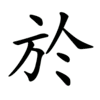於
See also: 于
| ||||||||
Translingual
| Stroke order | |||
|---|---|---|---|
 | |||
Alternative forms
- The Hong Kong standard form for this character is ⿸𭤨⺀, despite the fact that 於 is not related to 方 or 㫃 (see below).
Han character
於 (Kangxi radical 70, 方+4, 8 strokes, cangjie input 卜尸人卜 (YSOY), four-corner 08233, composition ⿰方仒 (GTJKV) or ⿸𭤨⺀ (H))
References
- KangXi: page 481, character 11
- Dai Kanwa Jiten: character 13628
- Dae Jaweon: page 843, character 7
- Hanyu Da Zidian (first edition): volume 3, page 2175, character 2
- Unihan data for U+65BC
Chinese
| trad. | 於/于* | |
|---|---|---|
| simp. | 于* | |
| alternative forms | 扵 | |
| The preposition senses. | ||
| simp. and trad. |
於 | |
|---|---|---|
| alternative forms | 扵 | |
| Other senses. | ||
Glyph origin
| Historical forms of the character 於 | ||
|---|---|---|
| Western Zhou | Warring States | Liushutong (compiled in Ming) |
| Bronze inscriptions | Chu slip and silk script | Transcribed ancient scripts |
 |
 |
 |
Characters in the same phonetic series (於) (Zhengzhang, 2003)
From an ancient variant form of 烏. Not related to 方 or 㫃.
Note the other uses of 于 (yú), the simplified and variant traditional form of the preposition senses.
Etymology
- Preposition
- From Proto-Sino-Tibetan *ʔaj (“to go; directional particle”) (Schuessler, 2007). It has slowly merged with and replaced the older 于 (*ɢʷa) (ibid.).
- Prefix in 於菟/於檡/於兔/於䖘
- Variant of 阿 (*qaːl, prefix in kinship terms and personal names) (ibid.).
This etymology is incomplete. You can help Wiktionary by elaborating on the origins of this term.
Pronunciation 1
Definitions
於
- (indicates time or place) in; at; on
- (used before a noun to indicate the object of an action) with; on
- 求助於人/求助于人 ― qiúzhù yú rén ― to ask people for help
- 不滿足於現狀/不满足于现状 ― bù mǎnzú yú xiànzhuàng ― not satisfied with the status quo
- 有益於健康/有益于健康 ― yǒuyì yú jiànkāng ― good for health
- 目前總的國際形勢和國內形勢於我們有利,於侵略者不利。 [MSC, trad.]
- From: 1950, 毛澤東 (Mao Zedong), 《给中国人民志愿军的命令》 (Order to the Chinese People's Volunteers), 《毛澤東選集》. English translation based on the Foreign Languages Press edition
- Mùqián zǒng de guójì xíngshì hé guónèi xíngshì yú wǒmen yǒulì, yú qīnlüèzhě bùlì. [Pinyin]
- At present, the international and domestic situation as a whole is favourable to us, not to the aggressors.
目前总的国际形势和国内形势于我们有利,于侵略者不利。 [MSC, simp.]
- (used before a noun, verb or adjective to indicate the target of action) to
- (indicates beginning or source) from
- (indicates the agent of action) by
- (indicates comparison) than
- (used after a verb or adjective) with regard to
- a surname
Compounds
Derived terms from 於
|
|
|
Pronunciation 2
Definitions
於
Japanese
Kanji
於
(“Jinmeiyō” kanji used for names)
- in (defines a place, a moment, a concept in order to describe its relationship with the surroundings)
Korean
Hanja
- This term needs a translation to English. Please help out and add a translation, then remove the text
{{rfdef}}.
Vietnamese
Han character
於: Hán Việt readings: ư[1][2][3]
於: Nôm readings: ơ[1][2][3][4], ở[1][2][3][4], ưa[1][2][3][4], ờ[1][2][3], ư[1][3], ớ[1][3], ô[3], ứ[3], thờ[3]
References
- Nguyễn (2014).
- Nguyễn et al. (2009).
- Trần (2004).
- Hồ (1976).
This article is issued from Wiktionary. The text is licensed under Creative Commons - Attribution - Sharealike. Additional terms may apply for the media files.